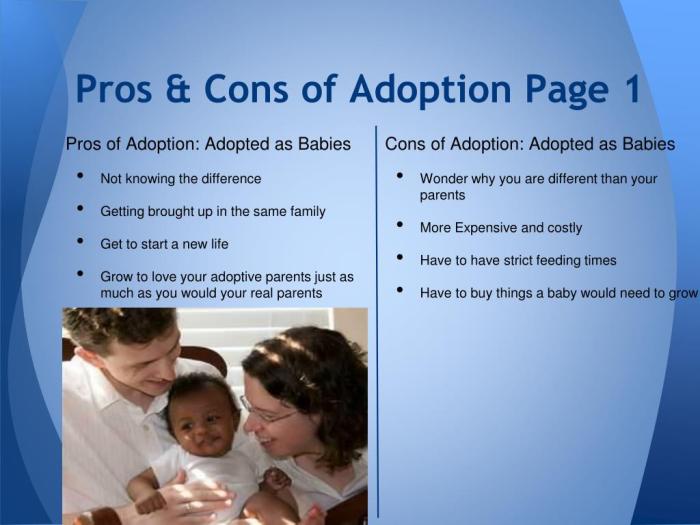Adoptive family advantages and disadvantages – The realm of adoptive families presents a tapestry woven with both advantages and disadvantages, offering a unique perspective on the complexities of family dynamics. This discussion delves into the emotional, psychological, legal, ethical, cultural, and social implications of adoption, providing a comprehensive understanding of this multifaceted topic.
Advantages of Adoptive Families

Adoption offers numerous emotional and psychological benefits for both children and parents. For children, it provides a stable and loving home, giving them a sense of belonging and identity. It also offers opportunities for education, healthcare, and other essential resources that may not have been available to them in their previous circumstances.
For parents, adoption brings the joy and fulfillment of raising a child. It allows them to share their love, values, and experiences, creating a lasting bond between parent and child.
Emotional and Psychological Benefits for Children
- Reduced risk of emotional and behavioral problems
- Increased self-esteem and confidence
- Improved academic performance
- Stronger social skills
- Greater sense of security and belonging
Emotional and Psychological Benefits for Parents, Adoptive family advantages and disadvantages
- Increased sense of purpose and meaning in life
- Improved mental and physical health
- Stronger relationships with other family members
- Reduced stress and anxiety
- Greater appreciation for the gift of parenthood
Disadvantages of Adoptive Families

While adoption offers many benefits, it is important to acknowledge the potential challenges that adoptive families may face. These challenges can include financial difficulties, behavioral issues, and social stigma.
Financial Difficulties
- Adoption costs can be significant, including legal fees, agency fees, and medical expenses.
- Adoptive parents may need to take time off work to care for a newly adopted child, which can result in lost income.
- Children who have experienced trauma or neglect may have additional healthcare needs that can be costly.
Behavioral Issues
- Children who have been adopted may have experienced trauma or neglect, which can lead to behavioral problems.
- These problems can include aggression, anxiety, and difficulty forming attachments.
- Adoptive parents need to be prepared to provide extra support and resources to help their children overcome these challenges.
Social Stigma
- Adoptive families may face social stigma and discrimination.
- This can include negative attitudes from friends, family, or even strangers.
- Adoptive parents need to be prepared to deal with these challenges and advocate for their children’s rights.
Legal and Ethical Considerations: Adoptive Family Advantages And Disadvantages

Adoption involves a complex set of legal and ethical considerations. It is important for all parties involved to understand their rights and responsibilities.
Rights and Responsibilities of Adoptive Parents
- Adoptive parents have the same legal rights and responsibilities as biological parents.
- They are responsible for providing a safe and loving home for their child.
- They must make decisions in the best interests of their child.
Rights and Responsibilities of Birth Parents
- Birth parents have the right to make decisions about the adoption of their child.
- They may choose to remain anonymous or to have contact with their child after the adoption.
- They have the right to receive counseling and support before and after the adoption.
Rights and Responsibilities of Adopted Children
- Adopted children have the right to know about their adoption.
- They have the right to contact their birth parents if they wish.
- They have the right to a safe and loving home.
Ethical Practices in Adoption
- It is important to ensure that all parties involved in adoption are treated with respect and dignity.
- Adoptive parents should be screened to ensure that they are capable of providing a safe and loving home for a child.
- Birth parents should be given the opportunity to make informed decisions about the adoption of their child.
Cultural and Social Impact

Adoption has a significant cultural and social impact on individuals, families, and communities.
Cultural and Social Impact on Individuals
- Adoption can help to bridge cultural gaps and promote diversity.
- It can provide children with a sense of belonging and identity.
- It can help to break down stereotypes and prejudices about adoption.
Cultural and Social Impact on Families
- Adoption can create strong and loving families.
- It can help to build bridges between different cultures and communities.
- It can provide support and resources for families who are struggling.
Cultural and Social Impact on Communities
- Adoption can help to create more inclusive and welcoming communities.
- It can help to raise awareness about the needs of children in foster care.
- It can help to promote the importance of family and child welfare.
Essential FAQs
What are the primary advantages of adoptive families?
Adoptive families provide stability, love, and support, offering children a sense of belonging and identity. They also contribute to societal diversity and bridge cultural gaps.
What are some of the challenges faced by adoptive families?
Adoptive families may encounter financial difficulties, behavioral issues, and social stigma. These challenges can impact family dynamics and relationships, requiring professional help and support.
What legal and ethical considerations are involved in adoption?
Adoption involves the rights and responsibilities of adoptive parents, birth parents, and adopted children. Ethical practices throughout the process ensure the well-being of all parties.